
Knowing what ingredients to look for in digestive vitamins will help boost your gut health for 2024. With so many options available, you must consider the formulations that target your digestion needs. Including vitamins from natural ingredients such as digestive enzymes, prebiotics, and probiotics helps promote digestion, reduce pain, and maintain a balance of gut microbiota.
Nudge offers specialized digestive supplements to address gut motility, dietary deficiencies, and stress. Their carefully crafted formulations contain potent ingredients that promote digestive health and relieve discomfort. By understanding the active components and their mechanisms of action, you can make informed choices that align with your personal health goals.
Our extensive research will examine aspects of digestive vitamins, including ingredient quality, dosage, and the specific health benefits you seek. This will, in turn, enable you to choose products that insist on supporting the digestive system and general well-being of your body with complete certainty.
Let’s get started!
Key Ingredients to Look for in Digestive Vitamins
Digestive vitamins can make a big difference in nutrient absorption, either for someone's digestion problems or to enhance nutrient absorption. Key ingredients like digestive enzymes, probiotics, and fiber promote smooth digestion, reduce discomfort, and support gut health. Focusing on these essentials will help you achieve a healthier digestive system:
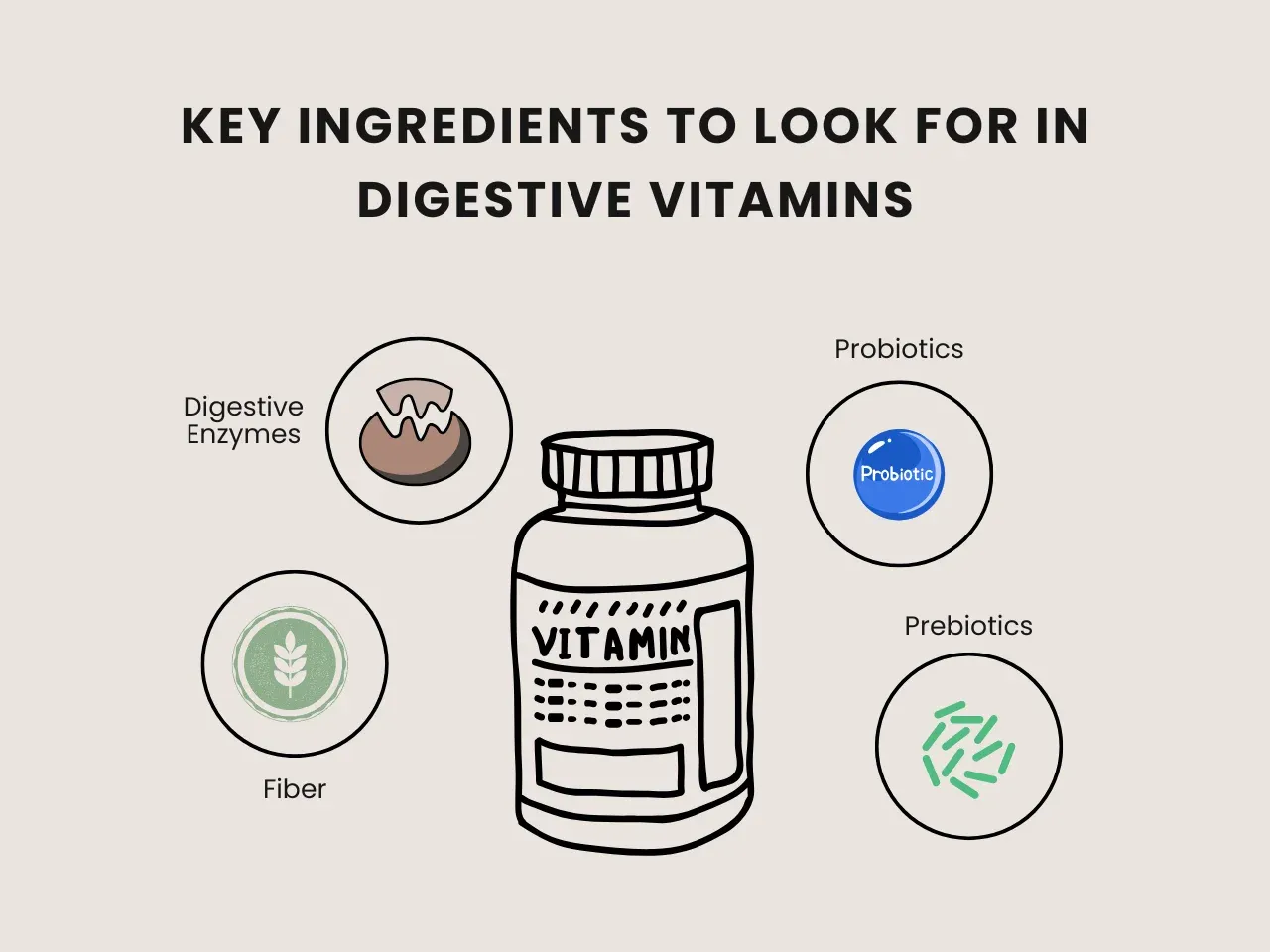
Digestive Enzymes
Digestive enzymes like amylase, protease, and lipase are crucial for separating food into absorbable forms. Amylase targets carbohydrates, protease focuses on proteins, and lipase digests fats. Enzyme supplements can significantly benefit those with food sensitivities, reducing bloating, gas, and other discomforts common in older adults. Understanding supplement types supports a targeted approach to digestive health.
Proteolytic enzyme supplements can significantly benefit individuals with food sensitivities or difficulty digesting fats, proteins, or carbohydrates. They ease digestion, reducing the likelihood of bloating, gas, and discomfort. Incorporating these enzymes into a daily routine can improve digestive comfort and enhance the body’s ability to process different foods effectively.
Probiotics
Probiotics are beneficial microorganisms inhabiting your gut that help maintain a balance by aiding digestion. They replace the good bacteria in your gut, enhancing digestion and minimizing the chances of experiencing certain irritating conditions such as bloating and discomfort. Supplementation with probiotics will keep your microbiome healthy, enabling it to digest food at an unprecedented rate and absorb its nutrients more adequately.
Some of the common probiotic strains include Lactobacillus and Bifidobacterium, which help with gut health and immunity. Lactobacillus ferments carbohydrates for gastrointestinal symptoms, whereas Bifidobacterium helps improve digestion and increases immune response. Regularly including such strains through supplements or fermented foods encourages a healthy gut environment, improving overall well-being and comfort.
Prebiotics
These fibers feed the helpful bacteria in the gut to further enhance probiotic effectiveness. They are integral to sustaining gut health, especially for those following a healthy diet that includes various food sources of prebiotics. By feeding opportunistic bacteria, prebiotics help maintain a healthy microbiome, enabling microbes to grow toward populations that favorably affect digestion and nutrient absorption.
Besides boosting gut flora, prebiotics are crucial in the regularity of the gut. Appropriate microbial balances are kept through them; these enhance natural body processes, leading to easy passage of digestion. Prebiotics help maintain digestive functions at their best and balance with anyone seeking a healthy gut.
Fiber
It helps promote regular digestion for average gut health. Fiber gives bulk to the stool, which might help reduce constipation and ensure smooth, regular bowel movements. High fiber in the diet helps smooth digestion by helping the body move food efficiently along the digestive passage, which can help minimize bloating and other discomforts of slow digestion.
For maximum benefits, look for soluble fibers that absorb water and form a gel-like substance in the intestines, such as psyllium husk or inulin. Fiber promotes regularity, nourishes beneficial gut bacteria, and supports a balanced microbiome. Adding fiber to daily nutrition enhances digestive health, making it essential in any support plan. Fiber is found in whole foods and supplements, simplifying maintaining digestive wellness.
Other Factors to Consider When Choosing a Digestive Vitamin
Choosing a digestive vitamin involves considering a host of variables other than ingredients. The form of the supplement can significantly influence absorption, convenience, and personal preference, especially for individuals with specific health conditions such as heart disease.
Form
Choosing the right form of digestive vitamins, whether a multivitamin or a specialized supplement like turmeric or magnesium, helps align with your health goals and supports better compliance. You can find them in many different forms, such as capsules, powders, chewables, and liquids, each created to meet different tastes and practices:
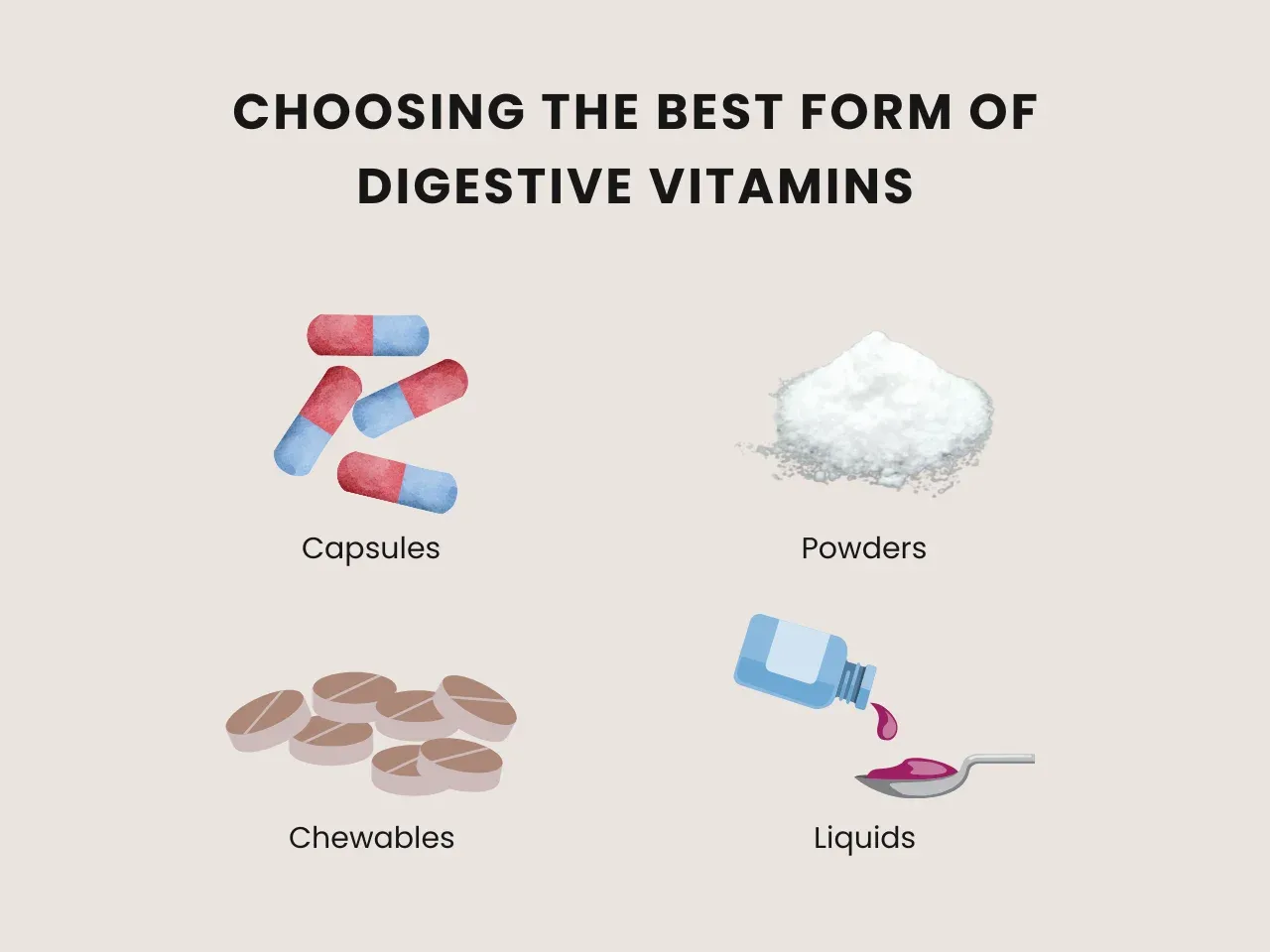
Capsules
- Advantages: Capsules are convenient and, therefore, easy to swallow, which is excellent for busy people. They contain the ingredients from air and moisture, which improves shelf life.
- Disadvantages: Capsules may not agree with all individuals, especially those having problems with swallowing pills. Other people may like to see or taste whatever they are taking, something a capsule will not allow.
Powders
- Advantages: Powders can be dosed efficiently and are usually mixed into smoothies or beverages for easy consumption. They often contain fewer fillers and additives than capsules or chewables.
- Disadvantages: Preparing powders requires more work and is less convenient for people on the go. Also, depending on the formulation, the taste may be a problem with some individuals.
Chewables
- Advantages: Chewable digestive vitamins are much more palatable and, in fact, quite pleasing to those who do not want to swallow pills. They can bring about an immediate sense of satisfaction, and they can be taken quickly by children or those with gag reflex issues.
- Disadvantages: Most chewable variants contain added sugars or artificial flavorings that could be a turn-off for those monitoring sugar intake or seeking cleaner elements.
Liquids
- Advantages: Liquid digestive vitamins are effortlessly absorbed within the body, making them very beneficial for people needing results overnight. Unlike pills, they can also be sweetened to make them tastier.
- Disadvantages: Liquid forms have a shorter expiration date and are often highly sensitive to temperature, requiring refrigeration to maintain potency. Some find the taste unpleasant with specific formulations.
When selecting a form, consider dietary restrictions, like gelatin-free capsules, for a vegan lifestyle. The right choice boosts compliance and digestive health. Opt for supplements certified by NSF International, the Office of Dietary Supplements, or approved by the U.S. Drug Administration to ensure quality, especially for essential nutrients like vitamin D, K, or fiber.
Dosage and Concentration
Understanding the appropriate dosage and concentration of digestive vitamins ensures their effectiveness and safety. Each individual has unique health needs that can influence the amount of active ingredients required, making it essential to approach supplementation thoughtfully. Check these key factors to tailor your dosage:
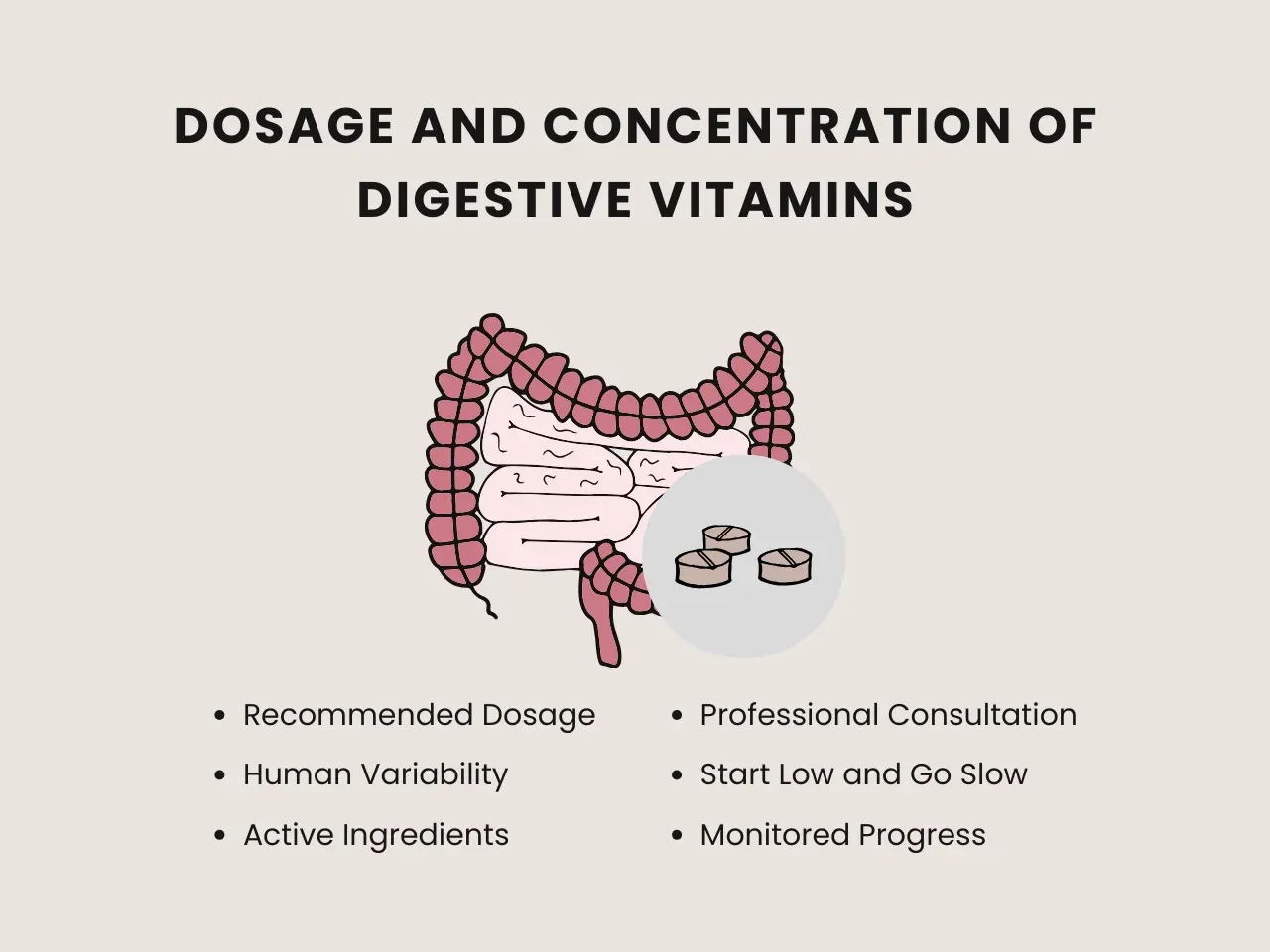
- Recommended Dosage: Follow the dosage indicated on the label. It should reflect your general health requirements and your specific digestion problems.
- Human Variability: Because of age, activity rates, and overall digestive health, only some people need active ingredients in the exact dosage. Supplements for blood pressure or beta carotene for eye health should align with each person’s health profile.
- Active Ingredients: Pay attention to the concentration of active ingredients, mainly probiotics and digestive enzymes. Following dosage guidelines maximizes benefits and minimizes the risk of serious side effects.
- Professional Consultation: Consult a dietitian or pharmacist who can tailor dosage recommendations based on your health history, reducing risks like side effects or nutrient interactions.
- Start Low and Go Slow: A starting dose of less than the standard therapeutic dosage of digestive vitamins is essential for the inexperienced. This will allow the body to acclimate to it gradually and reduce the possibility of potential digestive upsets, among other adverse reactions.
- Monitored Progress: When estimating your body's tolerance to the added supplement, you will have to take a different amount with the tuning of professional guidance. Regularly assessing your tolerance can help refine your supplement routine and support stable blood pressure, balanced blood sugar, and overall wellness through professional guidance.
Quality and Purity Standards
Getting the appropriate digestive vitamins calls for a quality and purity approach to ensure they are effective yet safe. With the supplementation options available, knowing what contributes to a quality product or supplement helps you narrow down your choices. Here are some of the most common things to take into consideration that can protect your health and conditions of your digestive well-being:
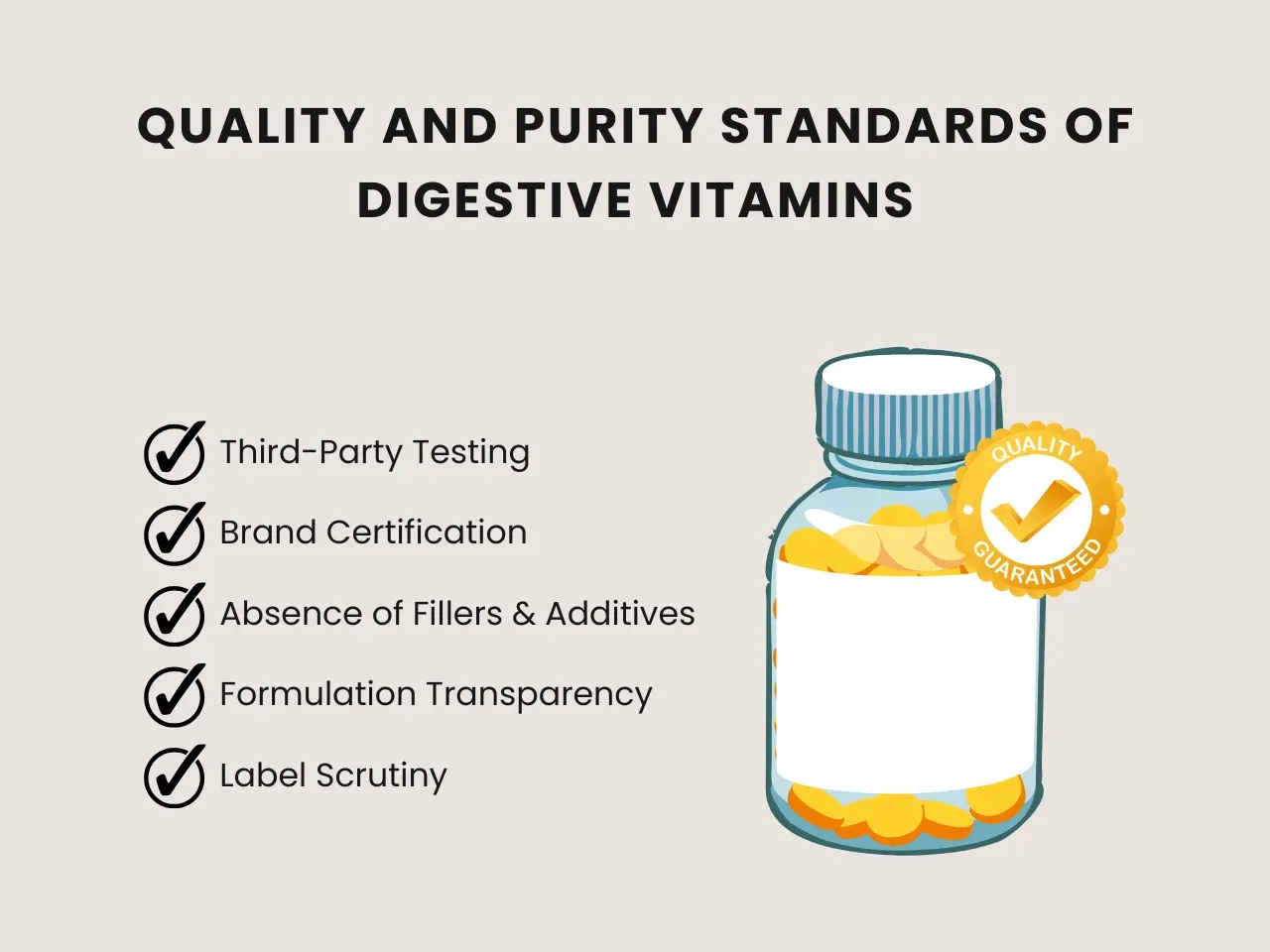
- Third-Party Testing: Consider supplements that have undergone independent third-party testing, as this provides unbiased analysis concerning the quality, potency, and safety of the product.
- Brand Certification: Choose reputable brands whose products are certified by accredited organizations. This ensures adherence to Good Manufacturing Practices, confirming the supplement meets safety and efficacy standards.
- Absence of Fillers and Additives: Opt for those without fillers, additives, or unnatural ingredients. Many digestive supplements incorporate ingredients that do not help them work better and may cause an adverse reaction in people with sensitive stomachs.
- Formulation Transparency: Opt for clean and transparent formulations to help you deeply understand your consumption. This will ensure that you nourish your digestive health with the best ingredients.
- Label Scrutiny: Carefully read labels and verify supplements include vital ingredients found in a variety of foods, supporting a balanced diet. Researching brands and reviewing certifications, like the National Institutes of Health, can also help you choose products that align with your health goals for safety and efficacy.
Digestive Vitamins for Specific Needs
Digestive problems vary from person to person, and the right digestive vitamins make all the difference. Understand your needs, whether bloating, constipation, or food sensitivities, to help guide your choices. Certain digestive vitamins and supplements contain specific ingredients to relieve digestive discomforts, contributing to good health and overall well-being.
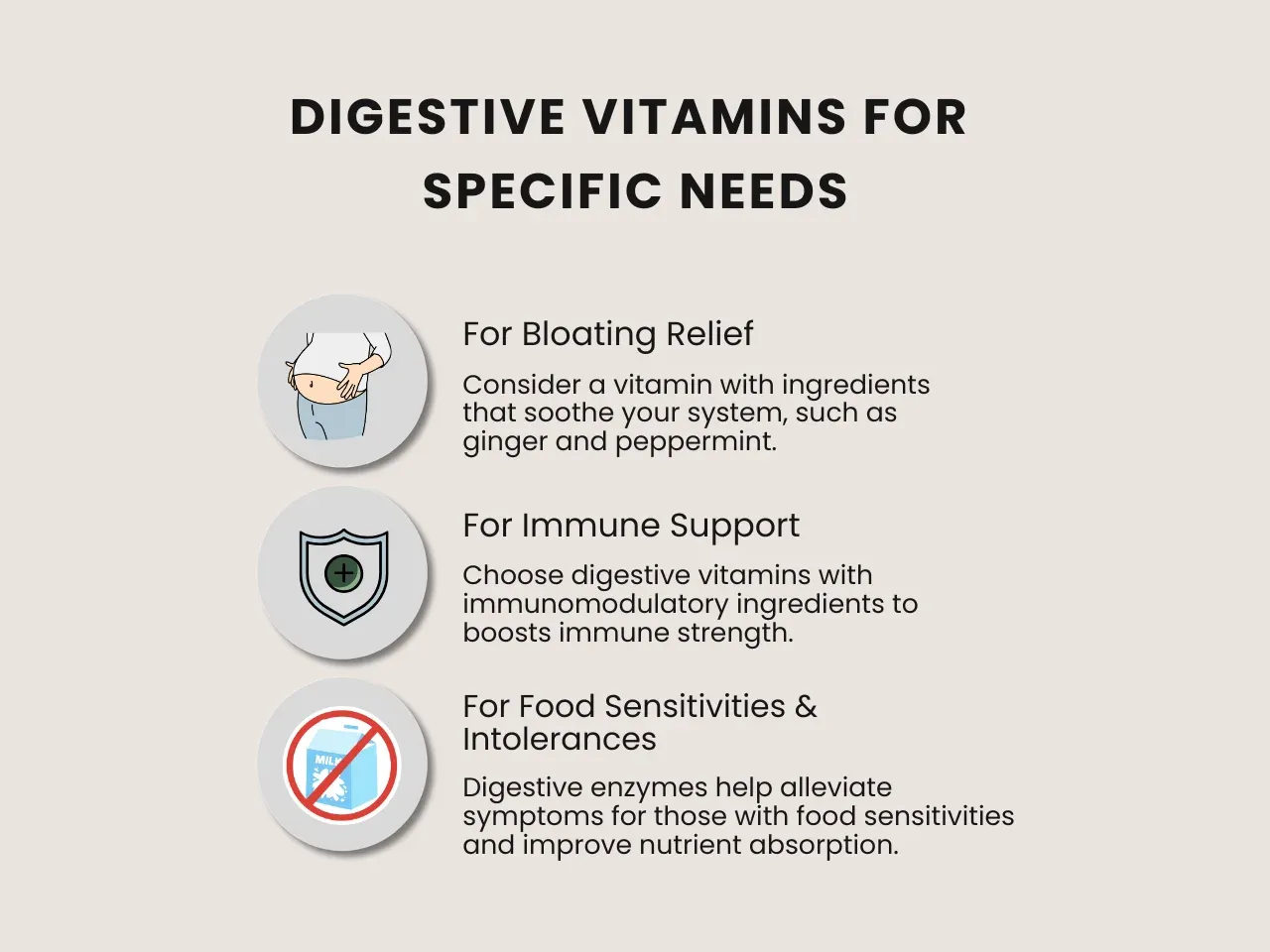
For Bloating Relief
For bloating relief, consider a vitamin with ingredients that soothe your system, such as ginger and peppermint. Ginger has been traditionally used to calm stomach upset and reduce gas, while peppermint works on relaxing gastrointestinal muscles for smoother digestion and less discomfort. Probiotics also go a long way in restoring your gut flora to its proper position, reducing bloating and gas since they will improve digestion altogether.
Look for digestive vitamins targeting the problem and containing helpful ingredients. This powerhouse formula could combine probiotics with natural herbs such as ginger and peppermint for ultimate comfort and digestive health. In fact, by adding these targeted supplements to your routine, you'll be able to combat bloating with even greater ease and have a much more comfortable digestive experience.
For Immune Support
Opting for digestive vitamins containing immunomodulatory ingredients helps provide the required immune strength. Probiotics like Lactobacillus and Bifidobacterium are vital ingredients, as they significantly impact gut health, which is highly related to immunity. Vitamin C, a powerful antioxidant, and zinc, essential for immune cell function, are critical additions to immunity-boosting supplements.
When choosing digestive vitamins for immune support, the body should consider combinations of these critical ingredients for an overall approach. Adding probiotics, vitamin C, and zinc would significantly affect the body's natural defenses against infections and diseases. Choosing a comprehensive supplement that supports various aspects of immune health equips your body to function optimally, especially during cold and flu season or times of stress.
For Food Sensitivities and Intolerances
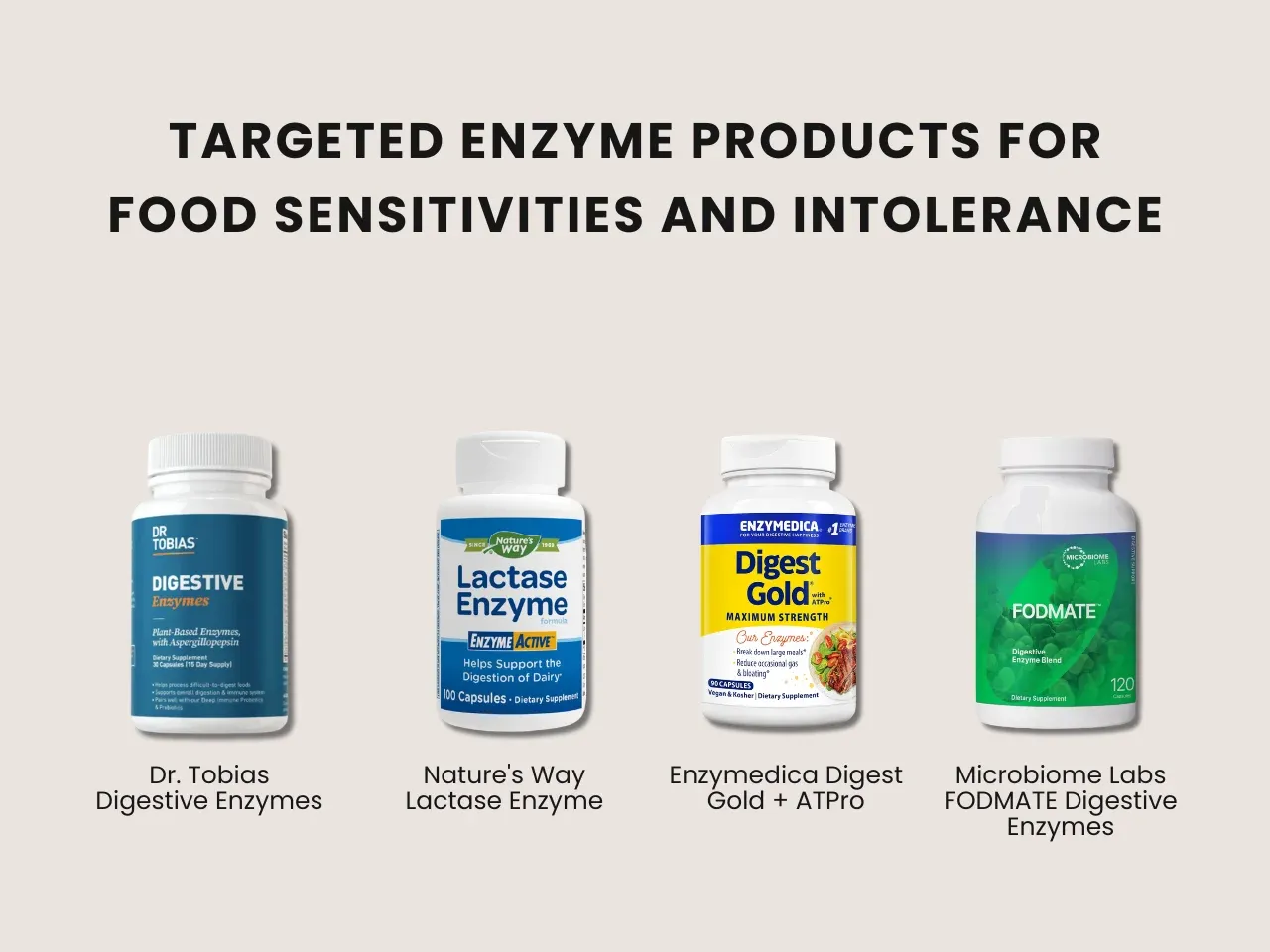
Enzymes like lactase are crucial for those with lactose intolerance, as they break down lactose and reduce symptoms like bloating and gas after dairy consumption. Amylase aids in carbohydrate digestion, helping those with issues digesting high-carb foods and improving nutrient absorption. Individuals with food intolerances can alleviate symptoms using the right digestive enzyme blend.
Dr. Tobias Digestive Enzymes
Dr. Tobias Digestive Enzymes contains Lactase, which will help people with lactose intolerance digest lactose inside the body. It's an intensive blend of 18 plant-based enzymes, including Amylase for carbohydrate digestion in support of gut health and Bromelain for the breakdown of proteins.
Nature's Way Lactase Enzyme
Nature's Way Lactase Enzyme is a unique formula containing 690 mg of Lactase per serving to help digest dairy products. Take 1 to 3 capsules before consuming dairy to minimize discomfort and support digestive health.
Enzymedica Digest Gold + ATPro
Enzymedica's Digest Gold + ATPro contains amylase, which helps digest carbohydrates, and a blend of other enzymes for full-spectrum digestive support. Fast-acting, this formula is ideal for foodies to help reduce bloating and gas after big meals.
Microbiome Labs FODMATE Digestive Enzymes
The Alpha-galactosidase in Microbiome Labs FODMATE Digestive Enzymes effectively degrades their FODMAPs with difficult-to-digest fiber, which causes bloating and gas. This allows users to enjoy nutrient-dense food while appreciating reduced digestive discomfort associated with high FODMAP intake.
Key Takeaway
In 2024, you will sort many digestive vitamins with different ingredients. Understanding your needs and what key ingredients will support your health is necessary. Syntax: "Formulations involving beneficial components like digestive enzymes, probiotics, and prebiotics are crucial in enhancing digestion, gut health, and common digestive discomforts." A well-chosen digestive vitamin can improve gut function and help maintain balance with nature, especially when combined with a healthy diet.
Think about your condition or digestion problems before making a purchase. Health analyses, such as checking symptoms with a practitioner and taking an IBS quiz or SIBO test, will help you determine your digestion condition and how to choose the right supplement. It's one proactive way to ensure that the products selected will be precisely what you need for effectiveness.
Ready to take a step in the right direction toward better digestion? Browse several digestive vitamins that help you achieve your health goals today. Probiotic supplements like Nudge are crafted to boost your digestive efficiency. Nudge targets food breakdown, dietary gaps, and digestive sensitivity to help you feel your best. Take the next step toward balanced digestion today!